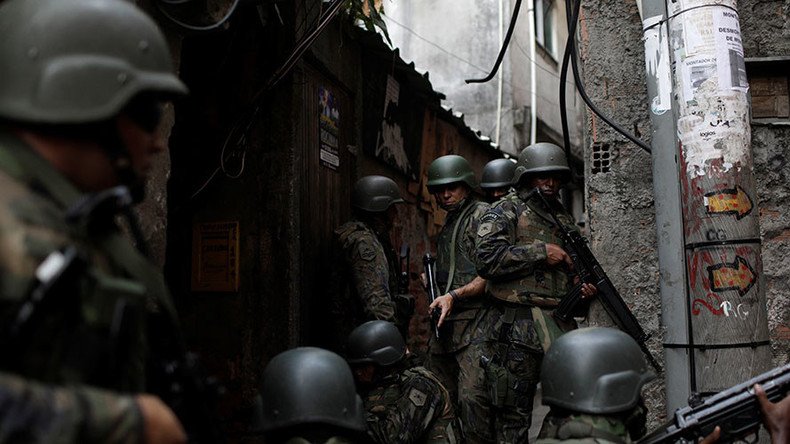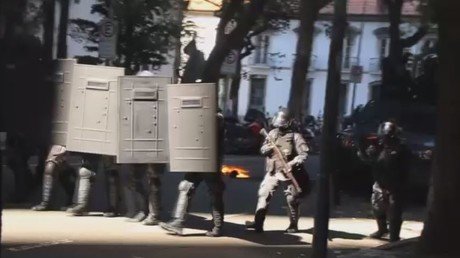Rio favela turns into warzone as hundreds of troops quell gang violence outbreak (VIDEOS)

Sounds of heavy gunfire filled the streets of Rio de Janeiro’s biggest favela, Rocinha, on Friday, as some 950 Brazilian troops, army helicopters and military vehicles flooded the marginalized area to assist police in suppressing gang violence.
RIO: Brasilian Army entered favela #Rocinha in #RiodeJaneiro, after a week of intense gun battles between rival drug gangsters & police. pic.twitter.com/Db6JAxrrOI
— Severin Jahn (@severin_jahn) 22 сентября 2017 г.
The moment troops descended onto the troubled neighborhood, notorious for its sporadic drug-related gang wars, was also captured on camera.
-Pezão, está tudo bem por aí?
— DMagritte (@DMagritte) 22 сентября 2017 г.
-Ah! Tudo normal! RiR indo de vento em popa!#Rocinhapic.twitter.com/fiR1Z46tIU
Scenes of a long convoy of army vehicles arriving to the favela and several military helicopters making their landing created an impression of a wartime deployment with some of the locals.
#Rocinha@Zn_noticias@radardabrasil@Niteroi_Noticia@InformacoesRj13pic.twitter.com/LzwNrE18UE
— Guadalupe News (@Guadalupe_News) 22 сентября 2017 г.
By assisting Rio with extra force, the government acted at the request of the city government, which lacks the resources to counter the rampant gang crime. The current surge in violence is tied to a gang war that broke out between two rival drug-trafficking factions on Sunday, when dozens of criminals entered the favela in a bid to seize control over the thriving drug trade.
RIO: The first soldiers arrived today morning with a military helicopter to end the ongoing violence in the favela #Rocinha. #RiodeJaneiropic.twitter.com/PUocMMQHvs
— Severin Jahn (@severin_jahn) 22 сентября 2017 г.
Late Friday, Brazilian Defense Minister Raul Jungmann declared the area to be “pacified,” adding that the hunt for drug traffickers engaged in scuffles was under way.
“Police troops, with support from the Armed Forces, are currently trying to locate criminals in the woods or in hiding places within the community,” Jungmann said, as cited by O Globo. The minister said the troops remain stationed in the area overnight, “at least until tomorrow.”
For the time of the operation, the shops were closed and all the vehicles were barred from the streets.
It is far from the first time Rocinha has made headlines as a hotbed for drug trafficking and crime. Back in 2011, a massive security operation was staged in the favela, featuring hundreds of police and military in a bid to regain control over the territory, overrun by drug dealers. However, Brazil’s financial troubles have dealt a blow to the police efforts to maintain order.
Following the 2016 Rio Olympics, the government found itself cash-strapped and was forced to cut social spending, including police funding, with a raft of austerity measures.
Late last year Brazilian lawmakers passed a controversial 20-year cap on public spending, tying it to inflation despite massive protests, including from the UN, to counter the worst recession in years.
In July, the authorities announced they were deploying 10,000 troops to Rio De Janeiro in response to a surge in crime, including drug-trafficking. At the time, Raul Jungmann described the situation on the streets as a “war.” The troops were to be stationed in the city until the end of 2018.
READ MORE: Rio de Janeiro deploys 10,000 troops to tackle crime surge













